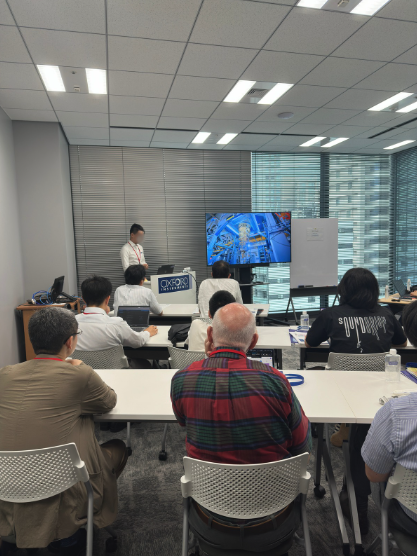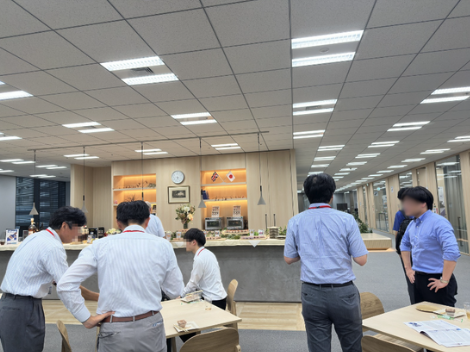Applications
 Part of the Oxford Instruments Group
Part of the Oxford Instruments Group
Expand
Collapse
Koichi Seo, Japan Country Manager
It is an exciting time to work in quantum in Japan. Recognising the technological innovation, highly skilled workforce and robust infrastructure available here, Oxford Quantum Circuits (OQC) and data centre company Equinix recently chose Japan as the location for OQC Toshiko. OQC Toshiko makes one of the world’s most powerful quantum computers accessible via colocation and interconnection services on Platform Equinix. At Oxford Instruments NanoScience, we are proud to provide the dilution refrigerators for this system.
To share more about our partners’ activities, this summer we hosted a Quantum Technology seminar at our Tokyo office. OQC and Quantum Machines (QM) gave presentations to visitors to our newly located Applications Lab. We were also proud to show guests our recently installed ProteoxS dilution refrigerator. Designed to be accessible to more academic and lab environments, the ProteoxS opens up more opportunities for low temperature and high magnetic field physics research.
Here at NanoScience, we remain committed to fostering collaboration and innovation in the quantum technology space. From developing advanced solutions to hosting networking events, we are proud to support Japan's position as a vibrant location for quantum. We are most proud of delivering systems to our customers, thanks to our hardworking team in Tokyo.
Our Quantum Technology seminar was not just for quantum physicists. It attracted a diverse audience, including members of the press, private companies exploring quantum business opportunities, and researchers. It was a place for quantum enthusiasts to come together and explore the real-world applications and development of quantum technologies.
Attendees had the chance to explore our Application Lab's advanced instrumentation, including an electron microscope detector, atomic force microscope, benchtop NMR, tabletop confocal microscope, and the new ProteoxS dilution refrigerator. These are extraordinary technologies, all operating within an ordinary office building.
The ProteoxS is our most compact dilution refrigerator, ideal for many markets. It spans general research, quantum technologies and optical applications and is suitable for customers not focused on quantum computing scale-up who require a high magnetic field or low temperature environment. The system is also suitable for those customers with a few of superconducting qubits or for spin-based quantum computing where the customer requires a smaller sample space to be compatible with our patented sample exchange solution and world leading superconducting magnets.

As a manufacturer, our greatest insights come from listening to our customers. Their ingenuity inspires our innovation, and their successes fuel our passion. We don't just create products; we cultivate partnerships. Nothing makes us prouder than amplifying the voices of those who use our tools to push the boundaries of what's possible.
We coordinated this event alongside our partners at OQC and Quantum Machines, both companies currently expanding their presence in Japan. Todd Tilma, Senior Quantum Engineer from OQC and Dr Hiroyuki Inoue from Quantum Machines showcased the standout features of their latest systems and how these are facilitating the delivery of quantum computing globally. Quantum Machines demonstrated their OPX qubit controller, which impressed attendees with its rapid installation and results generation.
OQC introduced the real-time parameters of Toshiko its 32-qubit superconducting quantum computer named after celebrated Japanese physicist Toshiko Yuasa. Operating from a data centre just down the road from us in Tokyo, Toshiko represents a huge milestone in quantum computing and is currently delivering outstanding latency and fidelity.

The seminar also highlighted the strategic importance of housing quantum computers in data centres, addressing challenges related to power consumption, research budgets, and compute capabilities. This approach facilitates the integration of classical and quantum computing, potentially accelerating the development of quantum advantage for real-world applications. Championing quantum computers in data centres, OQC has already installed its Toshiko system in a data centre only 10 kilometres from our office in Tokyo.
Housing critical IT infrastructure in data centres has also proved to be crucial for businesses, as it enables them to focus on core operations while leveraging advanced, reliable, and secure data management capabilities.
However, the benefits go beyond accessibility and more streamlined business processing. By allowing a larger range of people to access quantum computers, trial and error practices can take place, meaning development doesn’t stop and the technology can be consistently improved upon as it is developed. Installing quantum computers in data centres brings us one step closer to a mature quantum infrastructure and the transformative opportunities this brings.
Continuing to test our theories and our technologies and sharing these results with the broader scientific community will be essential in this endeavour. That is why we want to make sure our enabling technology is accessible via our Apps Labs, training opportunities and seminars like this one in Tokyo.
Our Apps Lab will serve dual purposes. Firstly, it will host events and provide comprehensive training, enabling users to maximise the potential of our instruments. This training will be particularly valuable for those unfamiliar with constructing and setting up ultracold systems. Secondly, we aim to introduce university students to professional-grade research equipment. This exposure will not only enhance their educational experience but also illuminate potential career paths within the instrumentation industry. By bridging the gap between academic learning and practical application, we hope to inspire the next generation of scientists and engineers.
We are excited to prepare for our next seminar - watch this space.